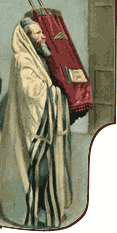


Divrei Torah Archives
Click Here For Printer-Friendly Format
Tu B'shbat 5768
|
TODAY'S MESSAGE IS DEDICATED
Would you like to be our next sponsor ?
The holiday of TU b'SHVAT is known as the new year of the trees. Contrary to popular belief, unlike the holy days of Rosh Hashanah, the new year for human beings, the trees are not judged on this day. Actually the trees are judged as well of the fruits that grow on them on the holiday of Shabuot. The reason why this day is called the new year of the trees is it comes at a point in time when in the holy land of Israel most of the rainfall has already fallen for the season. Our rabbis calculated that at this point in time the sap in the trees starts to flow. Therefore, it is called the new year of the trees.
Around the world, Jews have a custom at this time to eat many different types of fruits that grow as a gift from Hashem. Many communities have a custom to conduct a Seder-like meal where they eat different fruits in a special order and say different blessings and prayers to Hashem relating to each of the fruits. Many seek out an individual fruit that they haven't had all year long in order to say the blessing of She-hehiyanu on this night. If someone were to have more than one new fruit -- the blessing is only said once for all off the new fruits that a person might enjoy at one sitting. This rule of a single blessing only applies if all the fruits that require the blessing are in front of the person at the time when he says the blessing for the first time. Although, as we have stated, no trees are judged on this particular day, many have a custom to pray for the success of the Citroen crop so that they may find a beautiful Etrog for the holiday of Succoth. There are several lessons one should keep in mind on this day. Firstly, the Torah says, “For the man is the tree of the fields”. The sages teach as a tree must be protected from harsh weather and from harmful insects so too a man must protect himself from the negative influences of society –the media, philosophies and immorality that bombard a person on a daily basis.
WOULD YOU LIKE TO DEDICATE A MESSAGE IN HONOR OR IN MEMORY OF A LOVED ONE? REFUAH SHELEMA? Click Here to go to the 'Donations' area, or E-mail your dedication to RBEYDA2000@AOL.COM . You can Mail your check for: $101 - Shabbat And Holidays $52 - Weekdays Mail To: Raymond Beyda 408 Avenue O Brooklyn, NY 11230 |
||||
© Copyright 2026 Raymond Beyda Online
Dynamic Websites - Developed and Hosted by
